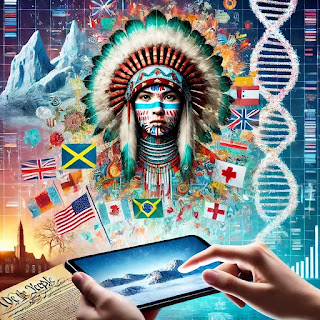When I first explored my genetic heritage through Genome Link, the results offered more than just scientific curiosity—they provided a profound sense of connection to history, culture, and identity. The breakdown of my DNA revealed I am 61% European, 24% Asian, and 16% "Other" (Arctic and Near East). However, what truly stood out to me was the 1% Native American DNA. Upon closer examination, the 16% Arctic/Near East also suggests an ancestral link to Indigenous peoples of the circumpolar regions, possibly Eskimo or related communities.
This discovery sparked a deep reflection on identity and belonging, especially as someone whose life has been shaped by a tapestry of cultural and religious transformations. It also raised a question: What kind of benefits or recognition might be available to me, as an American with traceable Native American DNA?
Understanding Native American DNA and Cultural Identity
The genetic marker of 1% Native American DNA is more than a scientific detail—it’s a window into a potential ancestral link with the original inhabitants of the Americas. The additional 16% Arctic/Near East classification could imply connections to ancient migratory patterns, where populations shared genetic and cultural ties across continents.
Native American ancestry, however, is not just about DNA—it encompasses shared culture, heritage, and tribal membership. In the United States, tribes are sovereign nations, and tribal affiliation often depends on direct lineage or documented connections, rather than percentages of genetic heritage. Therefore, while having Native American DNA is an intriguing discovery, formal recognition typically requires proof of descent from a federally recognized tribe.
Benefits of Native American Heritage
For those who are members of federally recognized tribes, there are several benefits provided by the U.S. government, as well as tribal governments. These include:
- Education Benefits: Members of federally recognized tribes may qualify for scholarships, grants, and tuition assistance through programs like the Bureau of Indian Education and various tribal colleges.
- Healthcare Access: The Indian Health Service (IHS) offers medical care to enrolled tribal members.
- Tax Exemptions: Some tribal members living on reservations may be exempt from state taxes.
- Housing Assistance: Programs like the Indian Housing Block Grant provide housing opportunities for eligible tribal members.
- Business Support: Native American entrepreneurs may access loans, grants, and federal contracting opportunities specifically reserved for tribes and their members.
Challenges and Realities
While these benefits are substantial, accessing them requires proof of tribal enrollment or descent, which usually involves documentation rather than genetic testing. Moreover, Native American identity is deeply tied to cultural participation and tribal recognition. DNA alone does not grant automatic access to the legal and cultural rights of Native peoples.
For me, the discovery of Native American DNA is less about pursuing governmental benefits and more about acknowledging the interconnectedness of human histories. It reminds me of the profound ways in which different civilizations have interacted, traded, and influenced one another, even across continents and millennia.
Embracing a Rich Heritage
Learning about my Native American DNA reinforces the idea that identity is multifaceted. As an Iranian-American, ex-Muslim, former vegan and socialist, and now a Christian conservative, I have lived a life defined by transformation and synthesis. This discovery is yet another layer in that journey. While I may not pursue tribal recognition or legal benefits, I choose to honor this connection by learning more about Native American history, supporting Indigenous causes, and acknowledging the ancestral threads that tie us all together.
In many ways, my DNA results are a testament to the melting pot of America, where diverse ancestries and identities come together. This discovery reaffirms my belief in the importance of preserving individual freedoms and cultural heritage, as embodied in the American Constitution—a document rooted in the principles of unity amidst diversity.
Conclusion
The 1% Native American DNA in my genome, along with the 16% Arctic/Near East heritage, is more than a percentage—it is a bridge to understanding the resilience and history of Indigenous peoples. While it may not afford me legal or tribal benefits, it inspires me to continue advocating for a world where all cultures and histories are respected and celebrated.
Citations
- Genome Link. "Explore Your Ancestry Through Genetic Testing." GenomeLink.io.
- National Congress of American Indians. "Tribal Sovereignty and Federal Recognition." NCAI.org.
- Bureau of Indian Education. "Education Programs for Native Americans." bie.edu.
- Indian Health Service. "Healthcare Services for Native Americans." ihs.gov.
- U.S. Department of Housing and Urban Development. "Indian Housing Block Grant Program." hud.gov.


No comments:
Post a Comment